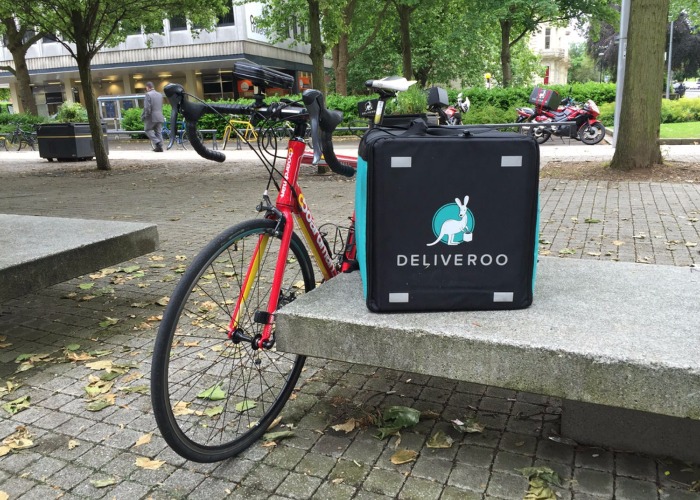Become a Deliveroo driver in the UK: tax, driving licence and how much you can earn

Working for Deliveroo can offer more flexibility, but how do you become a Deliveroo rider and how much can you earn? Read on to find out more.
Sections
Working for Deliveroo
Deliveroo has transformed the takeaway market since it was founded in 2013. It has also provided flexible working to thousands of people across the country. Last year it suggested that there are 50,000 Deliveroo riders in place, with thousands more applying to join each week.
So, how do you become a Deliveroo driver or cyclist? Are you an employee or self-employed? What equipment do you need? How much tax must you pay? And just how much money can you make?
Read on to find out all you need to know about working for Deliveroo.
Compare life insurance policies with loveMONEY
What is Deliveroo?
Deliveroo is an app and web food delivery business that allows people to order takeaways from an array of restaurants that may not traditionally offer a delivery service. Your meal is delivered to your door by a cyclist or motorcyclist.
It offers access to popular chains such as Byron burger or Wagamama who don’t do deliveries otherwise.
Originally, Deliveroo was only available in London, but it has since expanded to dozens of UK cities and hundreds of towns too. Deliveroo riders use a range of different methods from getting around ‒ there are Deliveroo cyclists, Deliveroo drivers, and even Deliveroo scooter riders.

Deliveroo riders respond to an app telling them where to collect food from and deliver it to and most deliver on their bicycle, using a large backpack to transport the food.
They decide when they want to work and how many hours they want to do. Some choose to work a three-hour shift over lunchtime and another three-hour shift in the evening, since that is when they are most likely to be called into action.
Tax and salary: will you be self-employed?
This is a contentious issue. Deliveroo riders are classed as self-employed, however there was a protracted legal battle to attempt to get riders recognised as employees. Such a change would have meant that Deliveroo riders would be entitled to sick pay, holiday pay, minimum wage and employer pension contributions. This ended in June 2021, after the Court of Appeal decided unanimously that Deliveroo drivers should be viewed as self-employed.
As a self-employed Deliveroo rider, you would need to fill out a tax return each year, declaring your earnings and paying Income Tax on them. Remember, your bike maintenance costs are tax-deductible.
Compare life insurance policies with loveMONEY
Start up costs
Deliveroo riders are offered certain bits of kit for free currently, once they join. For example, if you’re going to be a Deliveroo cyclist then you’ll get a reflective jacket, phone mount, helmet, small thermal bag and insulated backpack, while Deliveroo drivers are offered two thermal bags and a phone mount.
You need to have your own scooter, motorbike or bicycle and a smartphone though.
You have to pay for your bike’s maintenance yourself, which can rack up when you consider how much you will be using it. One Deliveroo rider said their brake pads now only last a few weeks, rather than months.
Insurance costs
Your bike or scooter is key to your ability to earn so getting it insured will protect you from the worst.
Conventional cycle insurers won't cover it, but if you go for a specialist like Insure 24-7, you can bag a policy. As they're not as common as standard cycle policies, you'll need to ring up and advisor to get a quote. It also covers scooters and motorcycles.
Similarly, you may want to think about insuring your smartphone. Most people either opt to use the cover provided their home insurance or take out insurance directly through their network provider.
Paying through your home insurance is convenient if your phone is covered by your policy anyway, but claiming might mean that your premium increases at renewal.
How much can you make?
Ultimately, the more deliveries you make, the more you will be paid.
The exact delivery fee will vary based on things like the size of the order, while there are ‘variable distance’ fees included too. Before Deliveroo riders accept any job, they are told precisely how much they will make from it.
What’s more, riders in certain areas benefit from short-term incentives, which bump up the fees they make on each delivery. For example, at the time of writing, Deliveroo riders in certain areas of Manchester, London, Thetford and Kirkcaldy can get an extra £2 or £3 per delivery if they work certain hours on Friday and Saturday nights.
According to analysis from jobs website Indeed, the average Deliveroo rider makes around £11.21 per hour.
Other money-making opportunities
If working at Deliveroo isn't quite the right gig for you, why not have a look at our guide to working at Uber? Or, for more money-making ideas, take a look at 21 ways to get rich.
Want more stories like this? Visit the loveMONEY homepage or sign up for our daily newsletter and let us send the news to you!
It's also wise to invest in a life insurance policy. Get a free, no obligation quote today
Comments
Be the first to comment
Do you want to comment on this article? You need to be signed in for this feature